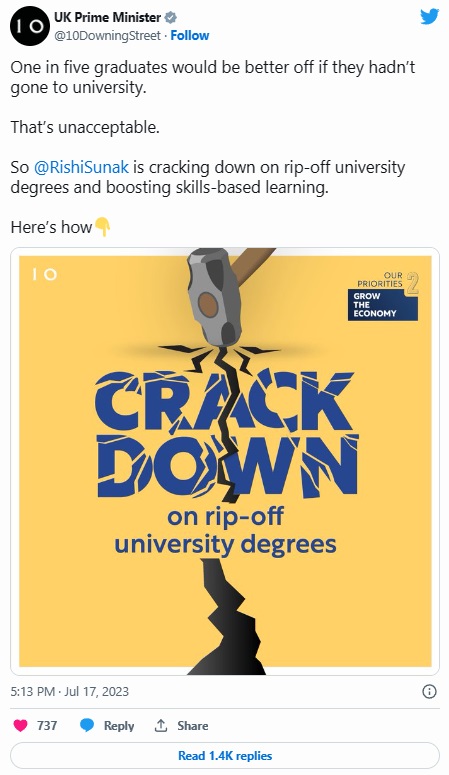[ad_1]
The authorities has promised to crack down on “rip-off levels” in England. It’ll place a cap on scholar numbers for programs that ship “poor outcomes” for college kids – as a result of they’ve excessive drop-out charges or don’t result in well-paying jobs.
The intention of the federal government intervention is to make sure that college students get applicable worth from their programs. It additionally intends to verify taxpayers aren’t left to foot the invoice when college students don’t earn sufficient to repay all of their scholar loans.
However capping scholar numbers on these programs might properly penalise college students from deprived backgrounds.
The programs which face capped numbers are more likely to be ones provided by universities which might be extra accessible to college students from deprived backgrounds, who’re extra more likely to attend much less selective universities native to them. However less-selective universities – and the programs they provide – play a major position in driving social mobility and supporting the native economic system.
Academic charity the Sutton Belief has produced rankings that measure universities’ affect on social mobility, wanting on the diploma decisions and earnings aged 30 of individuals born between 1985 and 1988.
Universities are ranked by evaluating the proportion of deprived college students who attended with the proportion of these college students who went on to attain excessive earnings. This rating locations newer, much less selective universities, such because the College of Westminster and the College of Greenwich, within the high 5.
What’s extra, analysis carried out by the Institute for Fiscal Research, the Sutton Belief and the Division for Training seemed on the social mobility affect of specific college programs.
As a result of the outcomes for specific universities or programs are affected by the traits of the scholars taking these programs – their educational means, for example – this analysis managed for elements reminiscent of GCSE outcomes. It discovered that programs that may be thought of to have low outcomes truly contributed strongly to social mobility, due to the decrease earlier achievements of scholars taking these topics.
Extremely ranked establishments – reminiscent of Oxford, Cambridge and probably the most selective Russell Group universities – are usually much less accessible to these from deprived backgrounds.
These establishments admit greater proportions of scholars from extra privileged backgrounds, who usually tend to have the social capital, monetary assets {and professional} expertise to assist them each graduate from their course and go on to a well-paid job. This may be one motive for his or her excellent efficiency on measures of high quality reminiscent of these used within the regulatory framework.
Total, a scholar from a low-income background is 4 instances extra more likely to be socially cell in the event that they attend college.
Scholar outcomes
Universities are already regulated primarily based on their scholar outcomes. In 2022, England’s college regulator, the Workplace for College students (OfS), launched a brand new regulatory framework, which assesses what number of college students go on from their first to their second yr, graduate, and go into an expert job or additional examine inside 15 months.
The OfS publishes information on these scholar outcomes. It may well intervene when universities don’t meet minimal expectations, and has the facility to impose a variety of penalties. These vary from further monitoring or fines to de-registration as a supplier of upper training. The cap on scholar numbers for specific programs now deliberate by the federal government is a further penalty.


The federal government is shifting rapidly in introducing further sanctions. There was little time to evaluate whether or not the penalties launched in 2022 have led to enhancements in greater training.
The federal government’s personal equality evaluation on the proposed modifications means that the context of the supplier and the traits of its college students will must be taken into consideration when imposing quantity controls.
Going to college might be transformative for younger folks. It supplies a window of alternative that results in employment, earnings and life success. What’s extra, college students enter universities with very completely different backgrounds, prior experiences and educational pursuits. They graduate with their very own notions of success and with completely different ambitions for his or her lives and careers.
Even supposing the very best earners subsidise those that don’t absolutely repay their scholar loans, we find yourself with a workforce that’s wealthy and diverse in background and abilities and various in its make up. The worth a level course has to supply alternative is maybe its biggest profit.
This text was initially printed in The Dialog on 20 July 2023. It may be accessed right here: https://theconversation.com/student-number-caps-on-rip-off-degrees-overlook-their-potential-benefits-for-social-mobility-209917
In regards to the Authors
– An utilized labour market economist, my analysis has examined the worth of levels and the position of sentimental abilities, to fatherhood and the position of household pleasant insurance policies in selling gender equality, and intersectional equalities in driving lack of entry to authorities help. With a powerful curiosity in Graduate Outcomes and scholar employability, I’m at present Affiliate Professional Vice Chancellor for Employability and Alternatives at UEA, with strategic oversight of our institutional technique for employability, with a concentrate on instructing and studying and the broader scholar expertise, Welcome Week and constructing learner communities, and placement exercise.
– labored within the training sector for 30 years, changing into a Professor of Studying and Instructing in Greater Training in 2019. She is a professional trainer and following ten years within the classroom she joined UEA as a Instructor Educator. She then progressed to College Instructing Director, Affiliate Dean, and since 2013 have held two Educational Director roles at UEA. Her present position of Affiliate Professional Vice Chancellor for Scholar Inclusion offers me educational oversight of our Inclusive Training Coverage and all Entry and Participation Plan associated points working with their widening participation workforce. She can be co-leading on the Studying for Societal Impression stream for the Aurora Alliance ( a European College co-funded by the EU by Erasmus+).
[ad_2]




